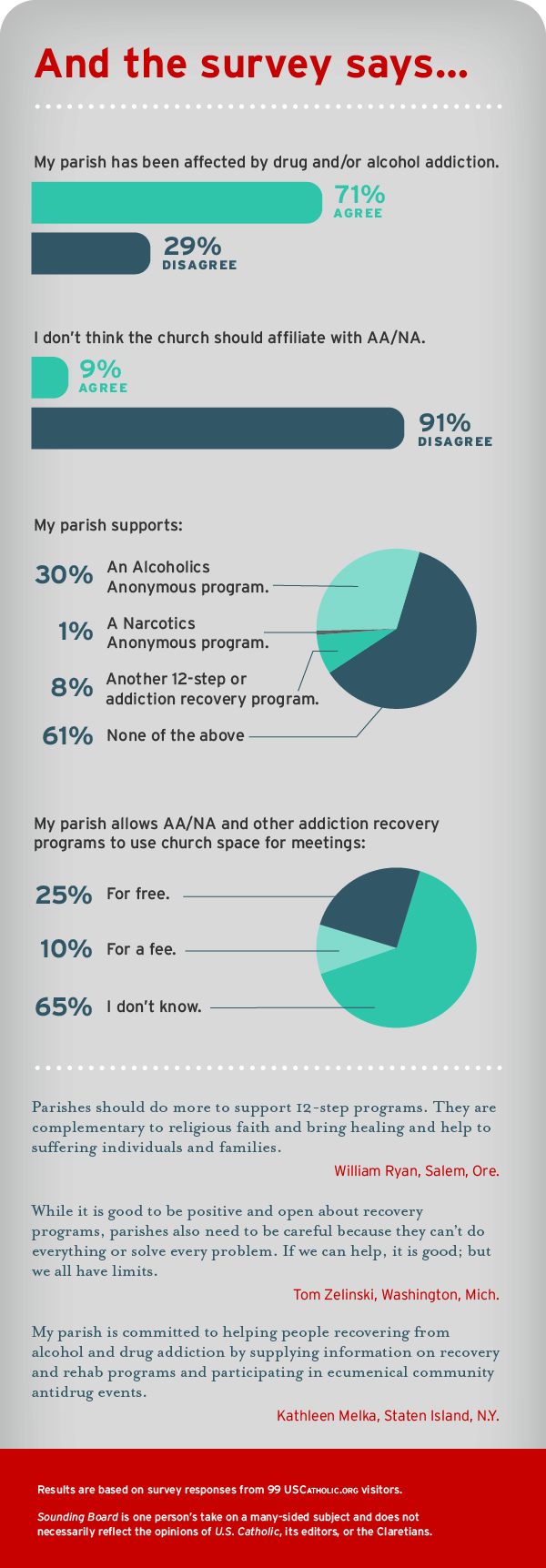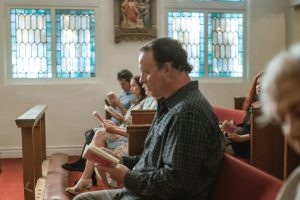At our little parish in Rhode Island, an Alcoholics Anonymous (AA) group meets once a week in the early evening. An Al-Anon group, for those affected by an addict, meets weekly on a different night in the church hall. Both groups are organized by their members, the majority of whom do not attend regular services at our parish. We provide the space to them free of charge. It’s easy to plug in the coffee pot, and parking is available and accessible. Small groups often linger to chat or have a smoke outside after the meetings. The times and locations of the meetings are in the church bulletin, which is widely read in our small town. These meetings take place with no fanfare, no money exchanged, and with an aura of friendship and respect.
What is remarkable about these groups meeting in our parish space is that it is such a normal and unremarkable occurrence. So many different churches around the country have a similar setup. When I look at the yellow book of AA meetings in our state, more than half meet in a church basement.
This informal collaboration between Catholic parishes and AA produces daily miracles. For example: The pastor or deacon who becomes sober through an AA group; the hopeless drunk on the church steps who tries to get sober but can’t. He dies and is remembered with a beautiful funeral in the church. Families of those who could not get sober talk with gratitude about the support that the AA community offered their family when they could not. The list goes on. Many have come into the church “through the basement doors” of an AA meeting. For an addict, getting sober can be a conversion experience. Of course, sometimes it’s not, and that’s OK too.
Most AA meetings and recovery programs acknowledge the need to ask for God’s help while struggling with addiction. Many AA meetings end with the Lord’s Prayer in recognition that it is by the grace and help of God that individuals are able to stay sober one day at a time. Other meetings end with the Serenity Prayer, which asks for God’s help but is nondenominational. Others acknowledge the help of a higher power without mentioning the name of God. A reliance on God (or a higher power) plays a critical role in recovery. As one recovering alcoholic who recently celebrated 27 years of sobriety told me, “I found out [during recovery] that there is a God, and I know there is one because the program works for me every day. I also found out that I am not God, but I have to rely on him.”
Addiction, sin, our failings, and our desperate need to ask for God’s immediate, intimate, and powerful help daily is a staple in so many churches. It’s no wonder that those in recovery will turn to churches for a safe haven to host meetings. And it is not surprising that deep friendship and respect has sprung up between places of worship and those in AA or similar recovery programs.
Yet this informal collaboration is not enough. Addiction is a leading cause of morbidity and mortality in the United States. Today a young person is more likely to die of a drug overdose in Rhode Island than in a motor vehicle accident. Much more needs to be done to help those struggling with addiction and working toward recovery.
With addiction comes shame and stigma. That shame often becomes a barrier for addicts that prevents them from seeking treatment. Encouraging, welcoming, and supporting 12-step meetings in our churches is a beautiful first step toward breaking down that stigma. Pope Francis has described the Catholic Church as a field hospital for the wounded—which includes those struggling with addiction. The church is not, or at least it should not be, a country club for the elite. It can be so helpful to hear a pastor, priest, or deacon acknowledge the human struggle with addiction. As Christians we need to proclaim that God offers grace, mercy, everlasting love, and forgiveness to everyone—including those struggling with active addiction. Often the first cry for help is heard within the church walls.
The wisdom of AA and 12-step programs shouldn’t be isolated to the church basement—these programs have things to teach us about God’s mercy. The concept of sponsorship, mentoring, or, put another way, discipleship, is a foundation of AA. Recovering alcoholics or addicts have invaluable experience, strength, and hope they can share with the still-suffering addict. No degree, profession, or formal authority is required. An experience of God’s mercy is all you need to share solutions and offer support. These relationships can start within a parish. Individual friendships and small group meetings remind us that we are all called to share our own encounters with Jesus. For a recovering addict, that encounter might have been on the journey to sobriety. As Catholics we need to ask what unique experience of our own we can share with others to show God’s mercy in our lives.
I am so very grateful for the friendship, respect, and support between our churches and recovery programs. But there’s more to be done to deepen that friendship, awareness, respect, and support.

Image: iStock.com/Rawpixel
This article also appears in the November 2017 issue of U.S. Catholic (Vol. 82, No. 11, pages 28–31).












Add comment